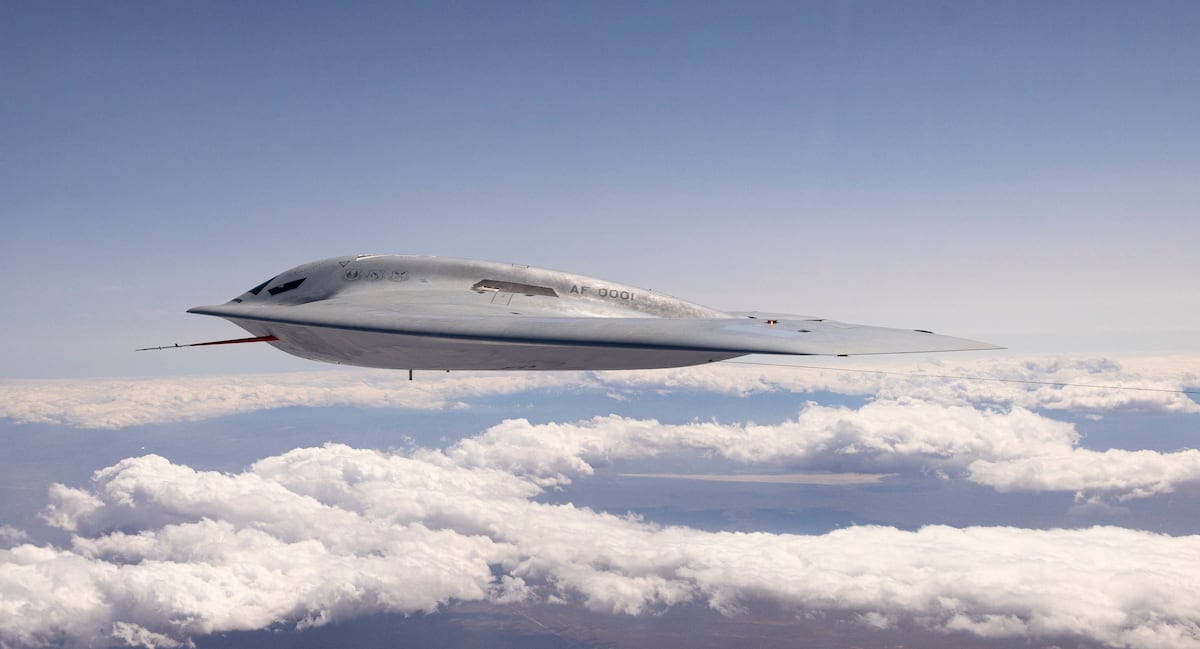Top British military official: “We are at the dawn of a third nuclear age…defined by multiple and concurrent dilemmas, proliferating nuclear and disruptive technologies and the almost total absence of the security architectures that went before,” Royal Navy Adm. Tony Radakin, chief of the defense staff, said Wednesday in a speech to the Royal United Services Institute in London. “The era of state competition primarily through geo-economics has shifted to a resurgence of geo-politics, and it will last decades,” Radakin predicted.
“This year’s most extraordinary development was the deployment of thousands of North Korean soldiers on the border of Ukraine,” he said. “And the possibility of tens of thousands more to follow as part of a new security pact with Russia, which could involve the exchange of the most sensitive technology and expertise between Moscow and Pyongyang.” Considering Iran exporting drones to Russia, Yemen and elsewhere, Radakin said “we are witnessing the world aligning into three groups.” Those include:
- “authoritarian states seeking to challenge the global rules.” That’s Russia, China, Iran and North Korea, he said.
- “responsible nations of the world. Most are democracies. But it also includes the Gulf monarchies and others who are committed to partnership and to the maintenance of stability and security in the world.”
- And lastly, “the third group of countries are hedging and ducking between the two for maximum advantage,” said Radakin.
You may wonder: What were the first two “nuclear ages”? The Cold War was first. “The second nuclear age was governed by disarmament efforts and counter-proliferation,” he said. But the third incorporates “the almost total absence of the security architectures that went before,” said Radakin.
His advice: Increase defense spending, and “renew both our submarines and warhead and to recapitalise our nuclear enterprise after decades of underinvestment…even though the real benefits won’t be realised for another decade at least.” Read the rest of his remarks, here.
Related commentary: “What one Russian satellite tells us about the future of nuclear warfare,” by Bill Hennigan, writing Thursday for the New York Times.
Welcome to this Friday edition of The D Brief, brought to you by Ben Watson with Bradley Peniston. Share your newsletter tips, reading recommendations, or feedback here. And if you’re not already subscribed, you can do that here. On this day in 1941, the British and Canadian militaries established Camp X, or Special Training School No. 103, for training Allied secret agents in Ontario, Canada.
Between the Pacific and Ukraine
Pentagon chief Lloyd Austin cancelled a recent trip to South Korea after this week’s martial law attempt by Seoul’s embattled President Yoon Suk Yeol, Reuters reported Thursday.
Update: South Korea’s acting military chief says he won’t obey another martial law decree, Yonhap news agency reports. Rumors had been circulating that Yoon might attempt another such order ahead of a possible impeachment vote in the National Assembly. “Even if there is an order for martial law issuance, the defense ministry and the Joint Chiefs of Staff will never accept it,” Acting Defense Minister Kim Seon-ho said Friday.
Another top military official said the same during talks with opposition lawmakers. That would be Lt. Gen. Kwak Jong-keun, chief of the Army Special Warfare Command, Yonhap reported separately. He also said that he defied an order from the recently-departed defense minister “to drag out lawmakers from the National Assembly building” during Tuesday’s six-hour period of martial law. “I did not fulfill that task even though I knew it would be insubordination because based on my judgment, dragging lawmakers out was clearly an illegal act,” he said Friday.
Three other top military officials have been suspended or transferred to other jobs for their participation in Yoon’s Tuesday order. That includes Lt. Gen. Lee Jin-woo, chief of the Capital Defense Command; Lt. Gen. Kwak Jong-keun, chief of the Army Special Warfare Command; and Counterintelligence Commander Lt. Gen. Yeo In-hyung, the Defense Ministry announced Friday. “Military prosecutors have also applied to the justice ministry for a travel ban for 10 military officials facing treason and other charges related to martial law, including the three commanders,” Yonhap reports.
Meanwhile in Romania, the nation’s top court just nullified the recent presidential election result, as officials blame “aggressive hybrid Russian attacks” for results that were deemed too incredible to believe.
Context via Reuters: “Having polled in single digits before the first presidential election round on Nov. 24, [pro-Russian candidate Calin] Georgescu — who wants to end Romanian support for Ukraine against Russia’s invasion — surged to a first-place finish that raised questions over how such a surprise had been possible.”
Romania’s intelligence service “also said access data for official Romanian election websites was published on Russian cyber crime platforms,” and it asserted “Georgescu was massively promoted on social media platform TikTok through coordinated accounts, recommendation algorithms and paid promotion,” according to Reuters. More, here.
New: Ukraine says it just created a drone with a range of 430 miles, Reuters reports from Kyiv. It’s known as “Peklo,” which translates to “hell” in Ukrainian, and it behaves like a cruise missile, Ukraine’s Herman Smetanin said.
In contrast, U.S.-provided ATACMS missiles have a range of about 190 miles.
Additional reading:
Trump 2.0
David Perdue, former senator and election denier, is Trump’s pick for ambassador to China. As a senator, Perdue served on the Armed Services Committee and the Foreign Relations Committee. Politico: “Perdue has significant business experience in Asia, including China, something he ran on during his Senate election in 2014,” including stints as the former CEO of Dollar General and a top executive at Sara Lee and Reebok.
Outsourcing specialist: “Perdue specialized throughout his career in finding low-cost manufacturing facilities and labor, usually in Asia,” Politico wrote in 2014. That didn’t save a company called Pillowtex, where Perdue was CEO when it collapsed, causing the loss of more than 7,600 jobs. More, here.
Trump is still staffing up for his promised immigration crackdown. On Thursday the president-elect named Rodney Scott as his choice to lead Customs and Border Protection and Caleb Vitello to lead Immigration and Customs Enforcement. The Times describes Scott as “an outspoken Border Patrol chief from [Trump’s] first term,” and Vitello as “a longtime [ICE] official.”
Additional reading:
Fallout from China’s Salt Typhoon hack continues
Feds who forced backdoors on U.S. telecoms think it’s time to insist on good locks. More than two months after the China-linked “Salt Typhoon” hack was publicly revealed by U.S. officials, the Federal Communications Commission is circulating a proposed rule to mandate basic cybersecurity in systems installed by telecommunications firms to comply with a 1990s-era wiretapping law.
Why now? “A senior administration official said Wednesday that the swaths of voluntary cybersecurity guidance used by the private sector has proved inadequate for protecting the affected telecom networks, and that minimum cyber requirements would have helped prevent the Chinese cyberspies from breaching the telecommunications systems,” David DiMolfetta of Nextgov/FCW reported Thursday.
Navies from the U.S., Japan and Philippines joined forces to patrol waters of the Philippines’ Exclusive Economic Zone in the South China Sea on Friday. “The patrol was staged about 40 nautical miles (74 kilometers) from Scarborough Shoal, a fishing area hotly disputed by Beijing and Manila off the northwestern Philippines,” the Associated Press reports, citing Philippine officials.
“Participating units included a U.S. Navy P-8A Poseidon from Patrol Squadron 47; the Philippine Navy BRP Andres Bonifacio and a C-90; and the Japan Maritime Self Defense Force Murasame-class destroyer JS Samidare (DD 106),” U.S. officials at Indo-Pacific Command said in a statement Friday.
Two days prior, “The Philippine coast guard said Chinese coast guard vessels, backed by navy ships, fired powerful water cannons and blocked and sideswiped a much smaller Philippine bureau of fisheries vessel escorted by coast guard ships off Scarborough Shoal,” AP writes.
Manila filed a formal diplomatic protest in response to the Chinese attacks. “Thursday’s protest is the latest in nearly 200 the Philippines has lodged against China under President Ferdinand Marcos Jr who has increasingly complained about what [he] says are Beijing’s aggressive actions in the South China Sea,” Reuters reported.
Around the Defense Department
Update: Air Force punts decision on 6th-gen fighter to Trump admin. Service officials said on Thursday that they will defer a decision about the Next Generation Air Dominance effort, which they paused earlier this year after initial projections put the cost of the fighter at three times the cost of an F-35 and the advent of new technologies and threats have altered how the service views air superiority.
The new administration’s views on NGAD remain to be seen. The defense chapter of Project 2025, penned by former Trump acting defense secretary Christopher Miller, supports a “next-generation air dominance system of systems,” but does not explicitly mention a crewed aircraft in its calls for new weapons, drones, and sensors. Elon Musk, a key adviser of the president-elect, has been vocal about his dislike for manned fighters. Defense One’s Audrey Decker has more, here.
And lastly: U.S. soldiers were recently arrested on human-smuggling charges near the Mexican border. “Emilio Mendoza Lopez, Angel Palma, 20, and Enrique Jauregui, 25, were arrested after a vehicle allegedly driven by Palma and carrying Mendoza Lopez, a Mexican national and two Guatemalan nationals was stopped Nov. 27 by law enforcement in Presidio along the border with Mexico,” AP reported Wednesday. DOJ spokesman Mike Lahrman said he “did not know the soldier’s ranks or whether action had been taken against them by the military. A spokesman for Fort Cavazos did not immediately respond to a request for comment.”
Read the full article here








Leave a Reply